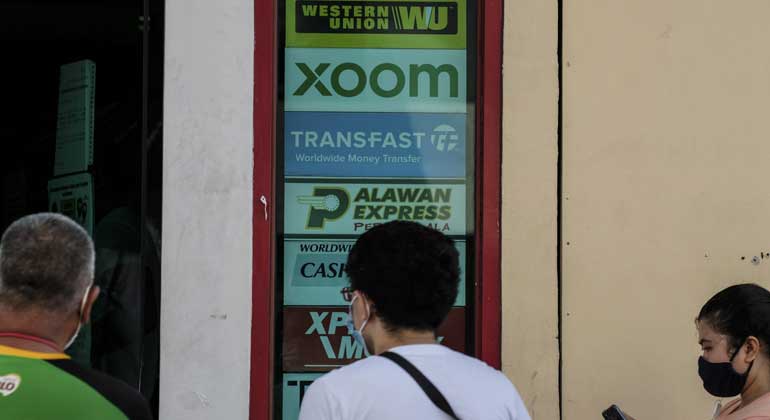
CASH REMITTANCES reached a seven-month high in July, as land-based overseas Filipino workers (OFW) continued to support their families during the coronavirus disease 2019 (COVID-19) pandemic.
Money sent home by OFWs through banks rose 7.8% to $2.783 billion in July from $2.581 billion a year ago, data from the Bangko Sentral ng Pilipinas (BSP) showed. The amount is the biggest since the $2.902 billion logged in December. July marked the second straight month of growth.
“This growth is mainly due to the 12.6% increase in land-based workers’ remittances, but was slightly tempered by the 9.2% decrease in sea-based workers’ remittances,” the BSP said in a statement.
Remittances from land-based OFWs rose to $2.467 billion in July, while money sent by sea-based OFWs dropped to $557 million as many lost their jobs and were repatriated amid the pandemic.
For the first seven months of 2020, cash remittances stood at $16.802 billion, 2.4% lower than the $17.219 billion in the same period of 2019.
Remittances from both land- and sea-based OFWs declined by 1.5% and 5.8% to $13.232 billion and $3.57 billion, respectively, in the seven-month period.
The United States is the biggest source of remittances as it accounted for 40.1% of the inflows, followed by Singapore, Saudi Arabia, Japan, the United Kingdom, United Arab Emirates (UAE), Canada, Qatar, Hong Kong, and Taiwan. The countries cumulatively accounted for 78.9% of total cash remittances from January to July.
So far, remittances from the United States, Singapore, Qatar, and Taiwan continued to grow year to date despite the pandemic, the BSP said. Meanwhile, inflows from Saudi Arabia, United Arab Emirates, Kuwait, Germany and the United Kingdom have dropped as the coronavirus crisis dragged on.
Personal remittances, which includes inflows in kind, also saw its second straight month of recovery with a 7.6% year-on-year growth to $3.085 billion from $2.867 in July 2019. This is also the biggest since the $3.216 billion logged in December 2019.
However, year-to-date flows are still 2.4% down to $18.658 billion against the $19.119 billion logged in the first seven months of 2019.
The growth momentum of cash remittances could be a sign this year’s slump will not be as bad as expected, said Security Bank Corp. Chief Economist Robert Dan J. Roces.
The BSP expects cash remittances to decline by 5% this year. The World Bank estimates a 20% drop in global remittances as migrant workers face pay cuts and job losses due to the pandemic.
“This could also mean OFWs who were fortunate enough to retain employment abroad or who had extra savings, especially the land-based components, are sending extra money to help their respective families. OFWs are benefitting from other economies which are opening faster than ours,” Mr. Roces said in a text message.
The depreciation of the dollar could also be a reason for the improvement in inflows, as this inflates remittances sent home in euros and yen in dollar terms, said ING Bank N.V. Manila Senior Economist Nicholas Antonio T. Mapa.
Despite remittances already recovering since June, Mr. Mapa said the remittance outlook this year is still clouded by the economic fallout from the pandemic.
“We continue to pencil in a return to weakness or at best a moderation in the growth posted in the past two months as job market challenges and layoffs make it difficult for OFWs to send home more funds in the coming months,” Mr. Mapa said.
More than 174,000 OFWs have been repatriated as of Sept. 12 due to the coronavirus crisis, according to the Department of Foreign Affairs (DFA). More than 112,000 of them are land-based OFWs, while about 61,000 worked in ships and cruises.
Foreign Affairs Assistant Secretary Eduardo Martin R. Menez said in a text message they expect around 300,000 OFWs will be brought home by December. — Luz Wendy T. Noble with inputs from Charmaine A. Tadalan
